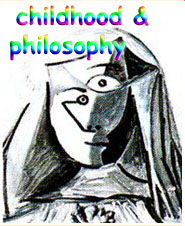siguiendo a los conceptos de filosofía con niños en la práctica de la formación docente
DOI:
https://doi.org/10.12957/childphilo.2019.44574Palabras clave:
filosofía con niños, formación docente, pedagogía de la reflexión, diálogoResumen
El diálogo profesor-alumno desempeña un papel central para facilitar el crecimiento continuo de quienes participan en la educación, en particular el diálogo que invita a los alumnos a reflexionar sobre la instrucción que se imparte y la propia maestra. El diálogo debe ayudar a los estudiantes a articular la autoconciencia (consciente o inconsciente) con respecto a su comportamiento y hábitos de aprendizaje y el proceso de aprendizaje y sus resultados al mismo tiempo que evalúa su calidad y las formas en que pueden mejorarse. Una de las razones detrás de nuestra creciente incapacidad para romper la barrera inherente entre maestros y estudiantes se debe a la falta de participación en la reflexión dialógica continua como un medio para avanzar en el proceso de enseñanza-aprendizaje dentro de la escuela. Este artículo ofrece una contribución teórica sobre el diálogo en la formación docente a través de los conceptos filosóficos de un programa de formación docente de diez años que fue diseñado de acuerdo con los principios de Filosofía con niños. El programa fomentó la creatividad y el pensamiento autorreflexivo en la formación docente y ofreció métodos dialógicos. Se basa también en seis dimensiones que son la base de la filosofía con niños: aprender desde un lugar de preguntas, una comunidad de aprendizaje que resiste la jerarquía educativa que se jacta de la omnisciencia, coordinador como participante en el proceso de aprendizaje, aprender en el presente real, legitimación de la improvisación como una forma de aprender, aprendiendo como liberando al alumno de los límites disciplinarios. Las seis dimensiones ven la filosofía con niños como una pedagogía de búsqueda en cuyo centro se encuentra la búsqueda de un significado que facilite el desarrollo personal y, por lo tanto,el auto-direccionamiento y capacidad.
Descargas
Citas
Alrø, H., & Skovsmose, O. (2004). Dialogue and learning in mathematics education - intention, reflection, critique. Dordrecht: Kluwer Academic Publishers.
Bohm, D. (1992). Thought as a System. London: Routledge.
Bohm, D. (1996). On Dialogue. New York: Routledge.
Buber, M. (1938/1962). The Problem of Man: A Philosophical Anthropological Investigation. Jersusalem: Mosad Bialik (Hebrew).
Burbules, N. C. (1991). “Varieties of educational dialogue.” In: David Ericson (ed.) Philosophy of Education. Normal, Ill.: Philosophy of Education Society, pp. 120-131.
Burbules, N. C. (1993). Dialogue in Teaching: Theory and Practice. New York: Teachers College Press.
Burbules, N. C., & Rice, S. (1991). Dialogue across differences: Continuing the conversation. Harvard Educational Review, 61(4), pp. 393-416.
Freire, P. (1970). Pedagogy of the Oppressed. NY: Continuum.
Gadamer, H. G. (1999). Truth and Method. New York: Continuum.
Goodlad, J. I. (1984). A Place Called School. New York: McGraw-Hill.
Goodlad, J. I. (1990). Teachers for Our Nation’s Schools. San Francisco: Jossey Bass.
Goodlad, J. I. (1994). Education Renewal: Better Teachers, Better Schools. San Francisco: Jossey Bass.
Gover, N. (2008). The Fereirean dialogue: Empowerment, libaretion, political literacy and social solidarity. In: N. Aloni (Ed.) Empowering Dialogues in Humanistic Education. Tel Aviv: Hakibbutz Hameuchad, pp. 195 - 213 (Hebrew).
Heckmann, G. (1981). Das Sokratische Gesprach: Erfahrungen in Philosophischen Hochschulseminaren. Hannover: H. Schroedel.
Isaacs, W. (1999). Dialogue and the Art of Thinking Together. New York: Doubleday.
Kizel, A. (2013). “Clashing Narratives in Civic Education in Israel.” Global Education Review 1 (3), 70–74
Kizel, A. (2016). “Philosophy with Children as an Educational Platform for Self-Determined Learning.” Cogent Education 3 (1), 1244026 https://doi.org/10.1080/2331186X.2016.1244026
Kizel, A. (2016a). Pedagogy out of fear of philosophy as a way of pathologizing children. Journal of Unschooling and Alternative Learning, 10(20), 28–47.
Levine, M. (2001). Standards for Professional Development Schools. Washington, DC: National Council for Accreditation of Teacher Education.
Lipman, M., Sharp, A. M., & Oscanyan, F. S. (1980). Philosophy in the Classroom. Philadelphia: Temple University Press.
Manen, M. van (1991) The Tact of Teaching; The Meaning of Pedagogical Thoughtfulness. Albany: State University of New York Press.
Marshall, H. (1990). Beyond the work place metaphor: The classroom as a learning setting. Theory in Practice, 29, pp. 94-100.
Nelson, L. (1949). Socratic Method and Critical Philosophy: Selected Essays. New Haven: Yale University Press.
Peters, R. S. (1966). Ethics and Education. New York: Scott, Foresman and Company.
Senge, P. (1994). The Fifth Discipline Fieldbook: Strategies and Tools for Building a Learning Organization. New York: Nicholas Brealey.
Shulman, L. S. (1986). Those who understand: Knowledge growth in teaching, Educational Researcher, 15, pp. 4-14.
Sirotnik, K. A. (2001). Renewing Schools and Teacher Education: An Odyssey in Educational Change. Washington, DC: AACTE Pub.
Slotte, S. (2004). Dialogue and systems intelligence: A work philosophy. In R. P. Hämäläinen & E. Saarinen (Eds.), Systems Intelligence: Discovering a Hidden Competence in Human Action and Organizational Life (pp. 39-55). Helsinki: Helsinki University of Technology.
Tynjälä, P., Välimaa, J. and Sarja A. (2003). Pedagogical perspectives on the relationships between higher education and working life. Higher Education 46 (2): 147 – 166.
Wegerif, R. (2008). Reason and dialogue in education. In: B.van Oers, E. Elbers, W. Wardekker, R. van der Veer (Eds.) (2008). The Transformation of Learning: Advances in Cultural-Historical Activity Theory. Cambridge: Cambridge University Press, pp. 273 – 288.
Zilberstein, M., Ben Perez, M., & Grienfeld, N. (2006). New Trends in Teacher Education Curriculum: Partnership between Colleges and Schools: The Israeli Story. Tel Aviv: Mofet (Hebrew).
Descargas
Publicado
Número
Sección
Licencia
el copyright de cada artículo pertenece a cada autor. childhood & philosophy tiene el derecho a la primera publicación. el permiso de reimprimir cualquier artículo que haya aparecido en la revista necesita de la autorización escrita del autor. en adisión a cualquier forma de reconocimiento requerido por el autor el siguiente aviso debe ser añadido a la declaración de permiso en la reimpresión (con los números apropiados a los puntos suspensivos): [título del artículo] fue publicado originalmente en la infancia y la filosofía, tomo ..., número ..., pp. ...-...




